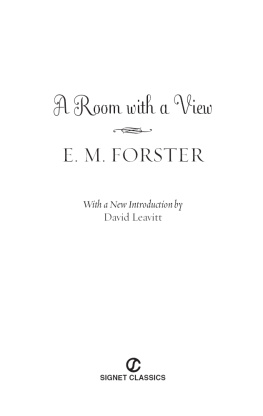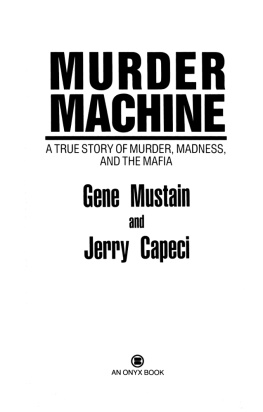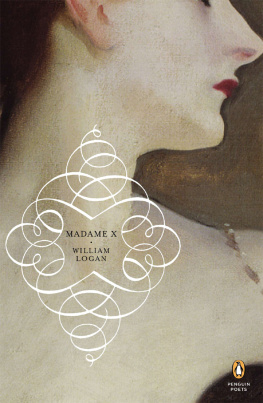E. M. Forster (18791970) was educated at Kings College, Cambridge, where he was for a time a Fellow. His first novel, Where Angels Fear to Tread (1905), was quickly followed by The Longest Journey (1907), A Room with a View (1908), and Howards End (1910), which received wide attention. Based on Forsters firsthand observations of Indian life, A Passage to India came out in 1924. His other works include collections of short stories and essays, a volume of criticism, the libretto for Benjamin Brittens opera Billy Budd, a film script, and a study of Virginia Woolf. In 1953, Forster was awarded membership in the Order of Companions of Honour by Queen Elizabeth II. On his ninetieth birthday, in 1969, he received the Order of Merit, the highest distinction outside of political rank that a British sovereign can bestow.
David Leavitts short story collections and novels include Family Dancing, A Place Ive Never Been, The Lost Language of Cranes, Equal Affections, While England Sleeps, The Body of Jonah Boyd, and The Indian Clerk, a finalist for the Pen/Faulkner Prize and the Impac/Dublin Award. Among his nonfiction titles are Florence, A Delicate Case, and The Man Who Knew Too Much: Alan Turing and the Invention of the Computer. He teaches at the University of Florida.
A Room with a View

E. M. FORSTER
With a New Introduction by
David Leavitt

SIGNET CLASSICS
SIGNET CLASSICS
Published by New American Library, a division of
Penguin Group (USA) Inc., 375 Hudson Street,
New York, New York 10014, USA
Penguin Group (Canada), 90 Eglinton Avenue East, Suite 700, Toronto,
Ontario M4P 2Y3, Canada (a division of Pearson Penguin Canada Inc.)
Penguin Books Ltd., 80 Strand, London WC2R 0RL, England
Penguin Ireland, 25 St. Stephens Green, Dublin 2,
Ireland (a division of Penguin Books Ltd.)
Penguin Group (Australia), 250 Camberwell Road, Camberwell, Victoria 3124,
Australia (a division of Pearson Australia Group Pty. Ltd.)
Penguin Books India Pvt. Ltd., 11 Community Centre, Panchsheel Park,
New Delhi - 110 017, India
Penguin Group (NZ), 67 Apollo Drive, Rosedale, North Shore 0632,
New Zealand (a division of Pearson New Zealand Ltd.)
Penguin Books (South Africa) (Pty.) Ltd., 24 Sturdee Avenue,
Rosebank, Johannesburg 2196, South Africa
Penguin Books Ltd., Registered Offices:
80 Strand, London WC2R 0RL, England
Published by Signet Classics, an imprint of New American Library,
a division of Penguin Group (USA) Inc.
First Signet Classics Printing, February 1986
First Signet Classics Printing (Leavitt Introduction), September 2009
Introduction copyright David Leavitt, 2009
All rights reserved
ISBN: 978-1-101-65716-4
 REGISTERED TRADEMARKMARCA REGISTRADA
REGISTERED TRADEMARKMARCA REGISTRADA
The scanning, uploading, and distribution of this book via the Internet or via any other means without the permission of the publisher is illegal and punishable by law. Please purchase only authorized electronic editions, and do not participate in or encourage electronic piracy of copyrighted materials. Your support of the authors rights is appreciated.
Introduction
A Room with a View, published in 1908 when its author was not yet thirty, has often been mischaracterized as the lightest of E. M. Forsters novels. In part this perception owes to the fact that the novel appeared only a year after The Longest Journey, the most ponderous, most autobiographical, and least read of Forsters books, though his own professed favorite. No doubt after The Longest Journey, Forster might have found it a relief to return to short paragraphs, to indulge his considerable gift for humor, even to give his chapters silly titles (Music, Violets and the Letter S, How Miss Bartletts Boiler Was So Tiresome, Twelfth Chapter) and his characters comical names (Eleanor Lavish, Cuthbert Eager, Cecil Vyse). The perception of lightness is also a function of the novels plot, which at first glance brings to mind The Enchanted April (1922), for the author of which, Countess Elizabeth Von Arnim, Forster worked as a tutor in 1905. In essence, the formula that Forster is using (as we shall see, for his own transgressive purposes) is to contrast rigid, gloomy, uptight England with sunny, beautiful, liberating Italy. As the novel opens, Lucy Honeychurch, an English girl brought up in an upper-middle-class Edwardian household, is making a tour of Italy under the chaperonage of her priggish cousin, Charlotte Bartlett. In a Florence pension, she meets and, against her will, falls in love with a fellow guest, the freethinking atheist George Emerson, of whom Charlotte disapproves. When George kisses Lucy in a meadow full of violets, Charlotte interrupts the scene. She then persuades Lucy that George has insulted her, at which point Lucy changes her mind about him, and, to prove it, becomes engaged to the stuffy Cecil Vyse. The cousins return to England, where Lucy encounters George Emerson a second time. After a period of considerable turmoil and indecision, she breaks off her engagement to Cecil. In so doing she flouts her familys wishes and asserts the integrity of her own desires and beliefs.
All of this would make for a fine novel, though not necessarily a great one. However, to read A Room with a View merely as a charming account of the liberating influence of Italy on the rigid Englishand we must remember that in The Enchanted April, the best Italy can do is to awaken the passion of a group of stodgy English husbands for their grateful wivesis to underestimate Forster, for whom the very conventionality of the novels plot provides an opportunity to undermine our expectations. In effect, Forster is playing what the French call a double jeu. It is only at the end that we realize that nothing in the novel is what it appears, least of all its authors intentions.
Consider, for instance, the structure. What more typical means would there be of conveying the Tuscan suns beneficent influence than to start off with the characters boarding a train in the English winter, as Forster himself did in his first novel, Where Angels Fear to Tread (1905)? In A Room with a View, he reverses this strategy. The novel opens in a Florence that never quite lives up to Lucy Honeychurchs expectations, while the second half brings her home to an England that proves to be surprisingly amenable to the needs of the human spirit.
As A Room with a View begins, Lucy and Charlotte have just arrived at the Pensione Bertolini. Despite the promises of the owner, whose Cockney accent disappoints Lucy, they have been given rooms that look into a courtyard rather than onto the Arno. To make matters worse, ].) Since the early nineteenth century, Florence had been home to a thriving expatriate colony that, by the time Forster first visited the city in 1901, had somewhat gone to seed. In A Room with a View, he mocks the colonys pretensions, mostly by filtering our experience of it through Charlottes starched sensibilities. Thus when the local British parson, the Reverend Cuthbert Eager, dangles before the cousins the possibility of a visit to the colonys inner sancta, it is Charlottes response that we are given:





![Harry Turtledove - Worlds that werent : [novellas of alternate history]](/uploads/posts/book/79050/thumbs/harry-turtledove-worlds-that-weren-t-novellas.jpg)




 REGISTERED TRADEMARKMARCA REGISTRADA
REGISTERED TRADEMARKMARCA REGISTRADA